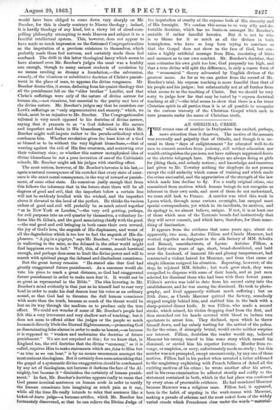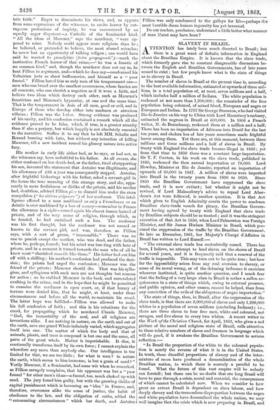AN ORIGINAL CRIME.
HE recent case of murder in Derbyshire has excited, perhaps, more attention than it deserves. The motive of the assassin was avowedly and palpably that of Othello, and though it is un- usual in these "days of enlightenment" for educated well-to-do men to commit murders from jealousy, still neither education nor wealth extinguishes the passions, nor have railways suppressed desire or the electric telegraph hate. Shopboys are always firing at girls for jilting them, and nobody notices ; and knowledge and resources had given to Mr. Townley nothing the shopboys do not possess except the cold audacity which comes of training and which made the crime successful, and the appreciation of the strength of the law which made him decline to fly. For a really original crime, one committed from motives which human beings do not recognize as inherent in their own souls, and most of them do not understand, we must still look to France. A murder was tried this week in Lyons which, through some curious oversight, has escaped most special correspondents, yet which in its incidents, its motives, and its apology is, we almost believe, unique. If not, it is at least one of those which men of the Teutonic breeds feel instinctively that they will never commit, and which have, therefore, for them some- thing of fascination.
It appears from the evidence that some years ago, about six
apparently, two men, Antoine Fillion and Claude Maucuer, had worked together as designers in the silk factory of MM. Schultz and Berattd, manufacturers, of Lyons. Antoine Fillion, a man forty-nine years of age, short, broad-shouldered, and bald over the forehead, of immoral life and gloomy temperament, had contracted a violent hatred for Maucuer, and from that cause or simple idleness resigned his situation. Repenting, however, of the step, he rejoined MM. Schultz ; but work grew slack, they were compelled to dispense with some of their hands, and as just men selected for dismissal those who had been with them fewest years. Fillion's service was held to date from his second entry into the establishment, and he was among the dismissed. He took to photo- graphy, and lived apparently without much suffering ; but on 30th June, as Claude Maucuer quitted the factory, somebody stepped roughly behind him, and stabbed him in the back with a sharp-pointed dinner knife. It was Fillion, who made a second stroke, which missed, his victim dropping dead from the first, and then stretched out his hands covered with blood to induce two spectators to arrest him. They declined, upon which he threw himself down, and lay calmly waiting for the arrival of the police. So far the crime, if strangely brutal, would excite neither surprise nor interest. Pillion, doubtless the reader would say, believed Maucuer his enemy, traced to him some story which caused his dismissal, or envied him his superior fortune. Murder from re- venge, or suspicion, or envy, unfortunately needs no study ; but this murder was not prompted, except unconsciously, by any one of these motives. Fillion had in his pocket when arrested a letter addressed to the magistracy explaining with French fullness of detail all the exciting motives of his crime; he wrote another after his arrest, and in his cross-examination he adhered stoutly and coldly to the statement contained in both, which in the last place was confirmed by every atom of procurable evidence. He had murdered Maucuer because Maucuer was a religious man. Fillion had, it appeared, been in the habit of arguing in the work-rooms with Maucuer, making a parade of atheism and the most naked form of the widely varied creeds which Frenchmen class under the words " =Asia-
istic faith." Eager to disseminate his views, and, as appears from some expressions of the witnesses, to excite horror by out- rageous professions of impiety, he was encountered by an equally eager disputant—a Catholic of the Seminarist kind. "All the ideas of Maucuer," says the murderer, "were op- posed to mine. Nobody could appear more religious than he ; be believed, or pretended to believe, the most absurd miracles; he never lost an opportunity of talking religon ; one would have said he wanted to proselytize (faire propagande")—mark the instinctive French horror of that crime,--" he was a fanatic of no common kind," and, though the murderer does not say so, he beat Fillion in argument, and—which he does say—condemned his Voltairian jests as sheer buffooneries, and himself as a "poor funnel." Fillion hated him as only men of his temperament can—. men who can brood over the smallest occurrences, whose fancies are all concrete, who can cherish a negation as if it were a faith, and believe two ideas which destroy each other, such as Maucuer's fanaticism and Maucuer's hypocrisy, at one and the same time. That is the temperament in Asia of all men, good or evil, and in Europe of those who develop either into madmen or atrocious villains ; Fillion was the letter. Strong evidence was produced of his sanity, and his confession contained a remark which all the evidence proved to be false, which, if true, is a greater atrocity than if also a perjury, but which happily is not absolutely essential to the narrative. Suffice it to say that lie left MM. Schultz and Beraud burning with hate, but without any intention of killing Maucuer, till a new incident roused his gloomy nature into active fury.
His mother in early life either had, as he says, or had not, as the witnesses say, been unfaithful to his father. At all events, she either confessed on her death-bed, or the father, tired of supporting his son, invented the statement that Antoine was illegitimate, and his allowance of t50 a year was consequently stopped. Antoine, after frightful bickerings with his father, asked a servant-girl in the house the true meaning of this strange story, and she, appa- rently in mere foolishness or dislike of the priests, said his mother had, doubtless, advised Fillion pert, to discard him under the stern compulsion (" les sevres exigences") of her confessor. This intel- ligence offered to a man maddened as only a Frenchman or an Asiatic is ever maddened by a loss of money—remember in France the allowance is a right—roused again his almost insane hatred of priests, and of the very name of religion, through which, as he fancied, he had sustained such a loss. The confessor was his first thought, but the confessor was not named or known to the servant girl, and was, therefore, as Fillion says, with a sort of groan, "inaccessible." There was no one to punish except the mother, who was dead, and the father, whom he, peril:Ts, feared ; but his mind was bursting with hate of priests, and in a moment it turned towards the man who of all he knew most" cherished canaille like those." His father had cut him off with a shilling ; his mother's confession had produced the deci- sion; the priests had urged the confession ; Maucuer was the friend of the priests; Maucuer should die. That was his syllo- gism, and syllogisms with such men are not thoughts but reasons for action ; so he stabbed Maucuer in the back, and surrendered exulting in the crime, and in the hope that he might be permitted to examine the confessor in open court, or, if that luxury of torture were denied him, that he might, at least, under those circumstances and before all the world, re-maintain his creed. The latter hope was fulfilled— Fillion was allowed to make his full confession of faith ; and this is his substitute for the creed, for propagating which he murdered Claude Maucuer, "God, the immortality of the soul, and all religions are inventions alike. I see nothing in nature, on the earth and out of the earth, save one grand Whole infinitely varied, which aggregates itself into one. The matter of which the body and that of animals, plants, and trees is composed is but one and the same, all parts of the great whole. Matter is imperishable. It dies, it continually transforms itself by its own force ; I cannot explain the wherefore any more than anybody else. Our intelligence is too limited for drat, we are too little ; for what is man ? in nature the earth, which seems to him immense, is but a grain of sand?" Verily Maucuer, if a Seminarist, had some wit when he remarked, as Fillion savagely complains, that his opponent was but a "poor funnel" for other men's ideas—a funnel, too, much choked up with mud. The jury found him guilty, but with the growing dislike of capital punishment which is becoming an " idea " in France, and, therefore, overcomes alike the sense of justice, the habit of obedience to the law, and the obligation of oaths, added the "extenuating circumstances" which bar death, and Antoine
Fillion was only condemned to the galleys for life—perhaps the most horrible doom human ingenuity has yet invented.
Do our readers, perchance, understand a little better what manner of man Marat may have been?































 Previous page
Previous page